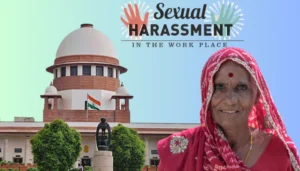Vishakha Vs State of Rajasthan

In the annals of Indian law, the Vishakha vs. State of Rajasthan case is remembered as a watershed point in the struggle against workplace sexual harassment. This important decision, issued by the Supreme Court of India in 1997, not only addressed a grave violation of a woman’s dignity, but also lay the groundwork for protecting women in the workplace across the nation.
The Background of the Case
The lawsuit stemmed from a tragic incident in Rajasthan in 1992, when Bhanwari Devi, a social worker involved in a government program aimed at avoiding underage weddings, was viciously gang-raped. Despite the gravity of the crime, the trial court acquitted the accused, sparking widespread indignation and spotlighting long-standing issues of gender discrimination and a lack of safety for women in the workplace.
Several women’s rights organizations, under the umbrella of Vishakha, filed a Public Interest Litigation (PIL) at the Supreme Court. The PIL sought justice for Bhanwari Devi and urged that standards be established to protect women from sexual harassment in the workplace, as there was no particular legislation addressing this issue at the time.
The Judgement
In a major decision issued on August 13, 1997, the Supreme Court acknowledged the lack of rules to combat sexual harassment at work. The court recognized the urgent need to close this gap and adopted a proactive approach by establishing guidelines that would serve as the law until relevant legislation was enacted by Parliament.
The Vishakha Guidelines, as they became known, were intended to safeguard women from sexual harassment in the workplace and to promote a safe working environment. These guidelines include:
1. The court defined sexual harassment broadly, including unwanted sexual advances, physical contact, requests for sexual favors, sexually colored remarks, and any other sexually related verbal or nonverbal activity.
2. Employer Responsibility: The decision required companies to take all necessary precautions to avoid sexual harassment. This included raising employee awareness, establishing a complaints committee, and ensuring that complaints were handled in a timely and impartial manner.
3. Complaints Committee: The court ordered that every business establish a Complaints Committee led by a woman and comprised of at least half female members. To maintain neutrality, an external member from an NGO or a legal expert has to be added.
4. Confidentiality and Protection: The recommendations underlined the need of maintaining confidentiality while dealing with complaints and protecting victims from retaliation or discrimination.
5. Education and Awareness: Employers were obligated to provide workshops and training programs to educate employees about sexual harassment and the court recommendations.
https://kaydajunction.com/86rapes-committed-each-day-in-india/
Impact of the Vishakha Decision
The Vishakha ruling marked a watershed moment in India’s struggle against sexual harassment. It not only raised awareness of the problem, but also enabled women to speak out against workplace harassment. The Vishakha Guidelines served as the legal basis for dealing with such incidents until the Sexual Harassment of Women at Workplace (Prevention, Prohibition, and Redressal) Act of 2013, which was largely influenced by them.
The case also underscored the importance of the judiciary in filling legislative gaps and upholding fundamental rights when the legislature fails to act. The Vishakha decision emphasized the significance of the right to equality, life, and personal liberty, as guaranteed by Articles 14, 15, 19, and 21 of the Indian Constitution.
Conclusion
The Vishakha vs. State of Rajasthan case is an important milestone in Indian legal history. It not only brought immediate comfort to innumerable women who were harassed, but it also prepared the path for a more complete legal framework to handle this widespread problem. The decision demonstrates the power of judicial activism in protecting persons’ rights and dignity, especially in the lack of legislative guarantees.
